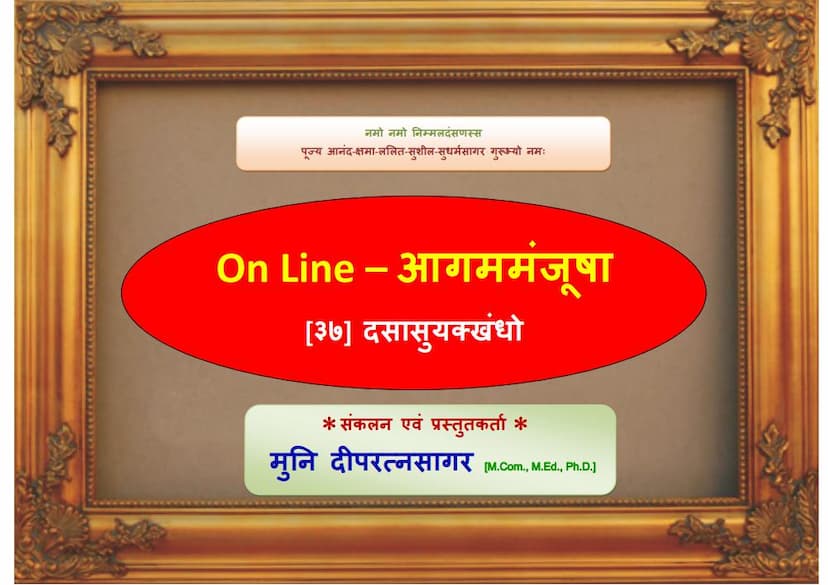Aagam Manjusha 37 Chheyasuttam Mool 04 Dasasuyakhandh
Added to library: September 1, 2025

Summary
This document is a digitized version of the Jain text "Aagam Manjusha 37 Chheyasuttam Mool 04 Dasasuyakhandh," compiled and presented by Muni Deepratnasagar. The text itself delves into various aspects of Jain philosophy and practice, as outlined in the following chapters or "adhyayanas":
Introduction (Page 2): The preface explains that the "Aagam Manjusha" was originally compiled 70 years prior (in 1942 CE) by Acharya Shri Anand sagarsuri. This online version, presented in 2012 CE, aims to make the text accessible digitally with some modifications, including the inclusion of "Niyukti" (commentaries) with the original sutras in some texts and the inclusion of "Bhashya" (exegesis) for others. It also notes changes in printing locations for certain sections.
Chapter 1: Asamādhishthānādhyayana (On Non-Equanimity) (Page 3): This section describes "twenty states of non-equanimity" (visam asamāhiṭhāṇā) as enunciated by the elders. These states involve improper conduct, attachment to desires, and a lack of proper mindfulness in various actions.
Chapter 2: Śabalādhyayana (On Mixed/Compound States) (Page 3): This chapter outlines "twenty-one entangled states" (ekavīsaṁ śabalā) described by the elders. These relate to actions performed with improper intention or in specific circumstances, such as improper handling of alms, eating at night, or engaging in activities that harm living beings.
Chapter 3: Āshātanādhyayana (On Offenses/Improprieties) (Pages 3-4): This chapter details "thirty-three states of offense" (tettīsa āśātanāō). These are primarily concerning the improper conduct of a disciple (śeha) towards their preceptor (rāyaṇiya). This includes disrespect, ignoring their instructions, or acting against their wishes in various situations like taking alms or sitting in their presence.
Chapter 4: Gaṇisampadādhyayana (On Qualities of a Leader/Acarya) (Pages 4-5): This chapter enumerates "eightfold excellences of a leader" (aṭṭavihā gaṇisampadā). These qualities include excellence in conduct (ācārasampadā), knowledge of scriptures (śrutasampadā), physical well-being (śarīrasampadā), eloquent speech (vacanasampadā), clarity of pronunciation (vākṣampradā), intellectual prowess (matisampadā), skill in application (prayogasampadā), and the ability to comprehend and manage (saṅgrahapariṇṇāsampadā). Each of these is further broken down into four sub-categories. It also elaborates on the four types of discipline (vinayapratipattī) and how they lead to liberation.
Chapter 5: Cittasamādhisthānādhyayana (On States of Mental Equanimity) (Pages 5-6): This chapter discusses "ten states of mental equanimity" (dasa cittasamāhiṣṭhāṇā). These are described in the context of a discourse by Lord Mahavir, where he explains how certain mental states can arise in monks and nuns. These include contemplating Dharma, remembering past lives, experiencing divine visions, or attaining higher knowledge like Ogha-knowledge (Oghajñāna), Manahparyaya-knowledge (Manahparyāyajñāna), or Kevala-knowledge (Kevalajñāna). The chapter emphasizes the attainment of equanimity and the subsequent destruction of karmas, leading to liberation.
Chapter 6: Śrāmaṇopāsakapratimādhyayana (On Vows of Lay Disciples) (Pages 6-8): This chapter details "eleven stages of a lay disciple" (ekādasā śrāmaṇopāśakapratimā). These stages represent a progressive commitment to Jain principles and practices, starting from a basic understanding of Dharma and moving towards more rigorous observances and renunciations. It describes the characteristics and specific practices associated with each of the eleven stages, from the first (Samāyika-vrata) to the eleventh (complete renunciation of worldly attachments and adherence to monastic discipline).
Chapter 7: Bhikṣupratimādhyayana (On Vows of Monks/Nuns) (Pages 8-9): This chapter outlines "twelve stages of a monk/nun" (dvādaśabhikṣupratimā). It details various stages of observance, including monthly, bimonthly, quarterly, and even stages lasting seven nights or a full day and night. It describes the specific rules and restrictions associated with each stage, including alms-taking, dwelling, speech, and hygiene. The chapter emphasizes the importance of rigorous practice and adherence to these stages for spiritual progress.
Chapter 8: Paryuṣaṇakalpādhyayana (On Observances during Paryushana) (Page 9): This chapter mentions "eight types of austerities/observances" (aṣṭavidhā tapasvinī). While not fully detailed in the provided text snippet, it appears to be a section on the practices performed during the Paryushana period, a significant festival in Jainism.
Chapter 9: Mohaniyāsthānādhyayana (On States of Delusion/Ignorance) (Pages 9-10): This chapter discusses "thirty states of delusion" (tīs mohaṇīyaṭhāṇā). It describes various actions and mental states that lead to the generation of deluding karma. These are often related to harmful intentions, deception, anger, greed, and attachment to worldly pleasures. The text details the consequences of these actions, leading to suffering in this life and rebirths in lower realms.
Chapter 10: Āyatanisthānādhyayana (On Places of Worship/Devotion) (Pages 10-14): This extensive chapter begins with an anecdote about King Shrenik of Rajagriha and Queen Chellana being deeply impressed by Lord Mahavir's teachings and deciding to follow the Jain path. It then delves into a discussion by Lord Mahavir about the consequences of desires and attachments, particularly in relation to human and divine pleasures. The discourse emphasizes that attachment to worldly pleasures, whether human or divine, leads to suffering and repeated births. It contrasts the path of renunciation and austerity with the pursuit of fleeting pleasures, highlighting that the former leads to liberation while the latter results in further bondage. The chapter elaborates on the concepts of "Nidāna" (making vows with specific desires for future enjoyments) and its negative consequences, emphasizing the importance of selfless devotion and adherence to Dharma for spiritual progress and eventual liberation.
Overall Theme: The "Dasasuyakhandh," as presented in this "Aagam Manjusha," is a foundational text in Jainism, offering guidance on ethical conduct, spiritual discipline, and the path to liberation. It systematically categorizes various states of mind, actions, and their karmic consequences, providing a framework for understanding and practicing Jain principles. The emphasis is on cultivating equanimity, avoiding offenses, developing virtuous qualities, adhering to strict vows, and ultimately transcending worldly attachments to achieve spiritual purity and freedom from suffering.